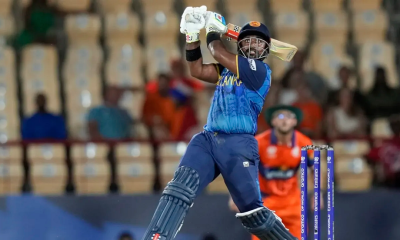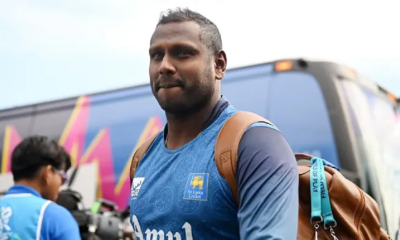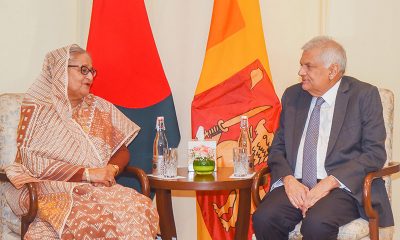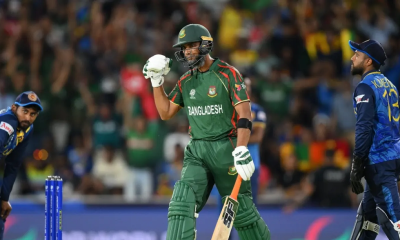Opinion
Are we the most gullible on earth?

By Dr Upul Wijayawardhana
I wish experts on human behaviour introduced a gullibility index, as this surely would have been the one, we could easily have topped! We have been fooled by politicians of all hues who have mastered the art of exploiting gullibility. We have been brainwashed to believe that family bandyism is an integral part of success in politics. We have been fooled into putting caste before the country. Our votes are cast not on policies but on the subtle, and the not so subtle, bribes. Whilst other countries borrow for developmental purposes, we borrow to repay political bribes and are in an abyss now, as a result. Even at this darkest hour, our politicians have put self-interest first, instead of getting together to save the country. Seeing no light at the end of the tunnel, professionals are fleeing in droves and soon we will be a country bereft of talent, on top of being financially bankrupt!
It is not only the politicians who exploit the gullibility of the masses. Paradoxically, even the intelligentsia are at it. Look at the proliferation of professors in Sri Lanka! It has become such an epidemic that University Grants Commission is reportedly considering laying down guidelines. How they are going to implement, I wonder! There are plenty of dubious universities the world over, awarding pseudo-degrees and appointing professors! Ayurvedic Medical faculties do not produce Ayurvedic doctors, all labelling themselves as doctors and practicing non-Ayurvedic medicine. Further, plenty of bogus doctors abound, practicing very successfully with no training at all!
It reminds me of a colleague of ours, who went on a Chinese government fellowship to study acupuncture for three months. On return, not only he became a specialist in the field but also set up an institution to teach and award degrees. Seeking legitimacy, he invited President J. R. Jayewardene, who happened to be the Minister of Higher Education, to award degrees at the convocation.
The danger of this was discussed at a Sri Lanka Medical Association council meeting and it was left for Dr N J Wallooppillai, as the President, and me, as the secretary, to appeal to President Jayewardene. Fortunately, we were able to approach President Jayewardene and convince him that he would be awarding degrees from an institution not recognised by the UGC. As it was too late to cancel, he attended but did not take part in the awarding of degrees!
Of course, gullibility is at its peak when it comes to religion which, in a way, is no surprise. After all, religion is the first and strongest brainwashing we get in life. More often than not, the religion we practise is based on birth, not on conviction as it should be. Gullibility is best exploited in this situation by so-called conversions. I have no problem with conversions based on convictions but most conversions are simple exploitations. Many rewards are offered in some religions for conversions resulting in conversions through, from marriage to trickery; almost all miracles falling within this category. The worst offenders are the cults and the only thing that has not happened in Sri Lanka is people killing themselves before the world ends!
There is much hype these days about a self-proclaimed prophet, supposed be close to some politicians too and he is accused of insulting other religions. Some politicians are up in arms demanding punishment which seems more for their political gain. Out of curiosity, I carefully watched YouTube video and am quoting verbatim what he stated, as media did not do so. During his preaching to a large cheering crowd, where Sinhala translation followed each line, he stated:
“This is what separates Christianity from Buddhism. This is what separates Christianity from Islam. Let us take Islam for instance. You can’t even call Allah, father! Are you hearing this? You have 99 names for God in Islam and yet, love is not one of them! This is what separates Christianity from Buddhism. Because for a Buddhist in their mind, it is like, Okay, annunta kala de tamanta palade In a sense it is true, especially if you do something to a prophet anyway. Now, but in the Buddhist mind they never hear the love of Buddha. Are you hearing me? Their focus is on enlightenment. Now, to be enlightened you need light. The Buddha himself, the name Buddha means enlightened one. Ladies and gentlemen, what is greater? Light or enlightenment? Jesus said ‘I am the light of the world.’ So, I tell you now, Jesus did not say I am the enlightened one.
No, no, no, Jesus came from a different wavelength. He said I am the light. So, I submit to you, the Buddha was looking for light. He was actually looking for Jesus. This is why every Buddhist needs Jesus. This is why every Muslim needs Jesus. This is Christianity that separates itself from Hinduism. Glory to Lord! Hindus are very close to the gospel. Buddhists are also very close to the gospel. Muslims are very close to the gospel. Very close.
That is why you need preachings like this. Let them take the next step. Sit down! Hinduism, the reason why they venerate so many animals. They don’t realise and hopefully after I said this will realise why they have a god that looks like an elephant. The reason why they have gods with ten thousand hands. They are not far from the truth. Why they venerate cows? They are very close but they are still far away. But what separates Christianity from Hinduism? It is this reality of life. Agape love. Some of you should tell your loving Hindu people, what you are doing may be true to you but there is a deeper truth. Never prosecute anybody. Never shame another person’s faith.”
As for me, these are not the words of a prophet, nor a preacher but the ramblings of an ill-informed individual who is making a living out of the gullible. The cheers for some of his ill-conceived statements amply demonstrate the gullibility of the audience. Their behaviour is in sharp contrast to our youth; I have been most impressed by the knowledge of Buddhism displayed by non-Buddhist children in quiz shows. In my opinion, the best way to handle ill-informed persons is to ignore them. In fact, past events support this. In January 2000, a series of chain emails spread the rumour that imported bananas were infecting people with ‘flesh-eating’ bacteria, adding that the FDA was trying to cover up the epidemic to avoid panic and encouraging readers to spread the word to their friends and family. FDA issuing a denial which only made matters worse!
Coming back to the pseudo-prophet, he displays gross ignorance as he implies light is needed for enlightenment! Light gets rid of darkness and that is not enlightenment!! He completely overlooks the fact that the Buddha was there six centuries before Christ, making it impossible for the Buddha to look for Christ!
After insulting all religions, the pseudo-prophet demonstrates the height of his hypocrisy by stating: “Never shame another person’s faith”!
Opinion
Arun Siddharth the troublemaker

By Rohana R. Wasala
A feature article in The Island Financial Review of February 16, 2023 served as a formal event announcement for the inaugural function of a new NGO called the People’s Convention on Good Governance (PCGG) that was scheduled to be held nine days later (i.e., on February 25). Some 1,600 delegates were expected to attend the event. Those included the then President Ranil Wickremesinghe (parliament elected following the ouster of Gotabaya Rajapaksa about seven months previously), prime minister Dinesh Gunewardane, cabinet ministers, opposition leader Sajith Premadasa, ‘a few noteworthy parliamentarians’, leaders of all political parties, the diplomatic community, corporate leaders, professionals, university deans, civic leaders, youth leaders, ‘noteworthy personalities’, and a representative group of citizens who cannot ‘influence good governance other than by making correct choices’; local and international media institutions were to be invited to telecast the proceedings for a worldwide viewership.
The convention that was accordingly conducted on 25 Feb., 2023 was a massive operation. It naturally occurred to me then that the Sri Lankan government had a serious responsibility to ensure that the huge benefits to be accrued from the lavish funds collected by the NGO should reach all the adversely circumstanced Sri Lankan citizens for whom generous international donors made them available; otherwise, the money would end up in the wrong hands, as it usually happens in Sri Lanka. The benefits of the largesse should be distributed equitably among the deserving without discrimination or favouritism that is based on race, caste, religion or ethnicity; the NGO activists owe it to the suffering masses.
Arun Siddharth (birth name: Arulanandam Arun), convenor of the Jaffna Civil Society Centre, was among the 1600 or so invited participants at the PCGG event which was held at the Bandaranaike Memorial International Conference Hall (BMICH), Colombo (on 25 Feb., 2023, as already mentioned). He had come with a delegation of about fifty Tamil men and women from Jaffna who had been persecuted by the LTTE.
Arun Siddharth took part in a panel discussion on ethnicity conducted by this new NGO, the PCGG. The positive implications of Arun’s participation in that important event for dispelling the dense clouds of disinformation and misinformation that constantly tarnish Sri Lanka’s international image as a sovereign nation cannot be exaggerated. Using the rare opportunity that came his way to share the stage with the big guns of the PCGG (such as Dr Paikiasothy Saravanamuttu being, among other things, the founder head of the NGO known as the Centre for Policy Alternatives), Arun Siddharth advanced arguments with supportive evidence to convince the members of the convention, especially representatives of the international community, that there is no problem of ethnic disharmony or conflict between the Tamil minority and the Sinhalese majority in Sri Lanka to be resolved and that the real issue that affects the lives of sixty per cent of the Tamil population in the North is the severe caste discrimination and oppression that is allowed to continue under the ruling political elite of that part of the island.
That elite includes the retired supreme court judge turned politician C. V. Wigneshwaran, and M. A. Sumanthiran. Arun Siddharth called their bluff and incidentally exposed the sham of reconciliation politics fraudulently sustained by the powers that be out of ulterior motives. He thereby delivered a potentially dangerous blow on the lucrative NGO industry that thrives on uncalled-for reconciliation efforts.
Arun Siddharth’s vocal participation in the panel discussion on the alleged problem of ethnicity must have proved to be a complete surprise, as well as a disturbing eye-opener, to most of the distinguished participants, because he flatly denied that there was any ethnic conflict in Sri Lanka to be tackled. He supported his argument with incontrovertible proof based on personal experience.
His revelation was perhaps an unintended blow to the NGO which was primarily set up to address a non-existent need for ‘reconciliation’, to build bridges between the majority Buddhist Sinhalese and the majority Hindu Tamils. The truth is that there is no need to build new bridges between the ordinary Sinhalese and ordinary Tamils, who in their mutually compatible and naturally co-existing (Hindu and Buddhist) religious cultures, together form over eighty percent of the population that is very tolerant and accommodating towards other religious communities.
The bridges are already there, though somewhat damaged recently by certain meddlesome international do-gooders (an ephemeral tribe of civil servants accountable only to the existing governments of the countries that they represent, but not to the common suffering, but sovereign, Sri Lankan masses). In my opinion, Arun Siddharth has great potential power to permanently repair these recently broken bridges, and he is emerging as a unique new star in the ascendant in the northern political firmament.
He actualises a break with the past in several ways. He doesn’t want to be a regional politician, unlike his casteist and racist elite counterpart who, while living safely in the South (Colombo) among the peaceful Sinhalese, visit the North (Jaffna) to do communal politics among the innocent Tamils, peddling the useful myth that the Sinhalese are their sworn enemies. Arun works with the downtrodden majority (sixty percent) of Tamils in that region, the so-called low caste Tamils, as one of them.Though the fighting cadres of the LTTE were mainly recruited from his class, his family experienced violence at the hands of the LTTE, and he was opposed to that organisation and the separatist goal it espoused.
Now in his forties, Arun says he remained silenced (presumably by pro-separatist forces). According to him, his father edited a Tamil language newspaper in Colombo, and he was a Marxist. Arun himself seems to mix his politics with Marxist ideas. Arun Siddharth is bravely taking on ‘disgusting caste based Tamil elite politics’ while also criticising the long entrenched Tamil separatist ideology. Equally significantly, he rejects brazen Indian expansionism in Sri Lanka. It is obvious he enjoys enthusiastic reception both in the South and in the North, which appears to be more marked in the former.
After two unsuccessful alliances (probably initiated by him as a fact-finding strategy) made with the mainstream national parties of the SLFP and the UNP consecutively, Arun has joined the Mawbima Janatha Pakshaya (MJP) founded and led by former lawyer and entrepreneur Dilith Jayaweera, where he was admitted to the supreme council of the party as a member. Later he was appointed the MJP Jaffna District Organiser by Jayaweera.
The MJP is the main constituent of the new alliance named the Sarvajana Balaya (All People Power), which is fighting the upcoming general election under the ‘Medal’ symbol. Arun Siddharth is Sarvajana Balaya’s parliamentary candidate for the Jaffna district. About a month ago, he made an impassioned as well as well reasoned appeal in eloquent Sinhala and Tamil for understanding and support from the national electorate both in the North and the South. Incidentally, it should be mentioned that Udaya Gammanpila’s Pivithuru Hela Urumaya (PHU) and Wimal Weerawansa’s Jathika Nidahas Peramuna (JNP) are also partners of the Sarvajana Balaya alliance.
Udaya Gammanpila is contesting for the Colombo district under the same symbol as Arun, i.e., the Medal. Weerawansa has decided to stay out of the contest, though obviously, the seasoned politician has no intention of leaving politics or the Sarvajana Balaya. It is also clear that whatever success the Medal achieves at the parliamentary election will ultimately contribute towards strengthening President Anura Kumara Dissanayake and his government, provided they are wise and humble enough to heed their constructive criticism and critical help.
Unfortunately however, Dilith Jayaweera’s inexplicable failure to cleanse lingering stains of his past association with the ruinous Rajapaksas and his questionable co-option of a character like Daham Sirisena, son of discredited former Yahapalana president Sirisena, will prove to be clear drawbacks unless remedied soon.
I for one have already proposed several times in the recent past that the main key to resolving Sri Lanka’s chronic as well as emergent political, economic, and social problems is the restoration of accustomed peaceful coexistence, cultural integration and solidarity between the Sinhalese and Tamil communities in the context of ineluctable realities of geopolitical pressures that have been and continue to be exerted on our island home for over two and a half millennia. Arun Siddharth from the North has much to contribute to restoring North South unity which is vital for Sri Lanka’s survival as a sovereign nation into the future.
Opinion
Possible scenario after general election

The three-member Cabinet including President Anura Kumara Dissanayake will have completed over fifty days in office as on the day of the general election.As an independent observer, keenly interested in the political scenario of the country, and having evaluated the performance of the present regime thus far, I think the following queries require public attention.
Has rhetoric taken precedence over action?
Has the strain of governance already taken its toll on the NPP administration?
Has their lack of experience been exposed?
Has the NPP/JVP combine bitten off more than they can chew?
Has the government betrayed the trust of 43% of voters reposed in it?
The possibility of the country having a hung parliament cannot be ruled out. The results of the recently concluded Elpitiya Pradeshiya Sabha election could be considered an indication.
It certainly will be an enormous, if not uphill, task for the incumbent NPP/JVP combine to secure a simple working majority, let alone a commanding one at the elections, considering that it is being conducted under the Proportional Representation (PR) system. To a great extent, the PR system provides for the accommodation of many minority parties/independent groups in parliament.
To form a government, the NPP may have to seek the support of others or independent groups. The ITAK, which presumably may gain the majority of the 29 seats in the North and East, could be one such entity. However, it is left to be seen whether they would cooperate or not, depending on the conditions they are bound to lay down for mutual advantage.
In my opinion, there is no gainsaying the fact that a majority of ex parliamentarians will re-enter Parliament. Further, considering the advantages of the PR system, a large number of Independent candidates could also enter parliament.
How many of such members will consent to extend support to the party planning to form a government remains to be seen. Here again, personal agendas will certainly take preference over national issues.Notwithstanding this aspect, some ad-hoc alliances might emerge to grab power.
WILLIAM PHILLIPSZ
Opinion
A new dawn for Sri Lanka
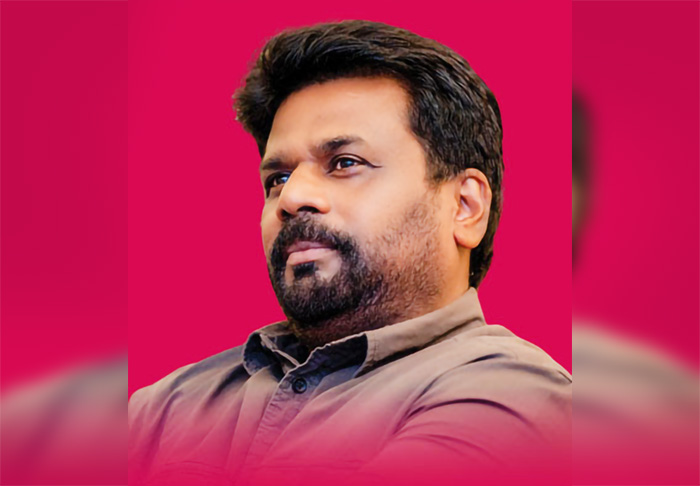
by Ayampillai Dharmakulasingham,
(Retired Sri Lankan career diplomat)
The Communist Party of India won Legislative Assembly elections in the Indian states of West Bengal and Kerala, establishing their respective governments. Leftist parties were also influential in some other states, especially in Tamil Nadu, though they could not capture power there.
In Sri Lanka, JVP/NPP leader Anura Kumara Dissanayake’s rise to the presidency marks a new chapter in the country’s history. The upcoming general election, on 14 Nov. holds significant importance and has raised hopes that Sri Lanka is undergoing a transitional period for good. It may mark the first time a left-wing party comes to power in Sri Lanka. There are other factors that make the upcoming election important. Major political parties have become notorious for corruption, mismanagement of national resources, family dynasties, elitist politics, etc. Corruption has been widespread throughout government, accompanied by nepotism, lack of transparency, and mismanagement of public funds
It is indeed true that the JVP’s presence in the northern and eastern regions, is not as strong as in the south, such as Galle, Matara, Hambantota, Anuradhapura, Kurunegala, and other districts. However, Anura’s popularity has drawn attention in the north as well. For the first time, substantial support appears to be emerging for the JVP in the northern and district districts of Jaffna, Batticaloa, Ampara, and Trincomalee. However, every parliamentary election has been similarly heralded as “historic” by the press and media, though often without substance. The major parties – the United National Party, Sri Lanka Freedom Party, and Sri Lanka Podujana Peramuna – have ruled Sri Lanka repeatedly, with the media often playing a supportive role by portraying each election as historic, ultimately misleading the public.
Sri Lanka’s first left-wing political party, the Lanka Sama Samaja Party (LSSP), once had widespread support across the country and grew powerful enough to become a significant opposition force. The plantation population, in particular, supported both the LSSP and the Communist Party. The LSSP achieved major victories in parliamentary elections after the 1940s. In response, the first Prime Minister, D. S. Senanayake, revoked the citizenship of people of Indian origin, stripping them of their political rights. As a result, the LSSP lost a significant portion of its support base. When the citizenship rights of people of Indian origin were revoked, the prominent Tamil leader G. G. Ponnambalam served as a key Minister in the UNP Cabinet. Although he opposed the provisions of the Act within the Cabinet, Prime Minister D. S. Senanayake ultimately prevailed. Despite his opposition, Ponnambalam failed to take meaningful action to protect the political rights of the hill-country Tamil population. This perceived betrayal led S. J. V. Chelvanayakam to leave the Tamil Congress Party and establish the Federal Party.
In the northern and eastern regions, the parties and organizations that once formed the traditional alliances of the Tamil Alliance and other Tamil parties have fragmented. They are now contesting the general election as separate alliances. Like it or not, the Federal Party remains somewhat influential today, although its support base is not as strong as it once was
Tamil parties have often criticized and blamed the major national parties as being racist. Ironically, most Tamil political parties – such as Thamil Arasu Katchi, Tamil Congress, and the Tamil National Alliance – include “Tamil” in their names. In contrast, the Sri Lanka Freedom Party, United National Party, and Sri Lanka Podujana Peramuna do not reference any race in their names. Yet, Tamil parties have continued to win elections by appealing to Tamil-speaking people with claims that only the major parties are racist. Some insights into racism are important here. Muslim citizens representing major parties have been elected as members of Parliament in predominantly Sinhala areas. However, the stark reality is that the Muslim population in the North and East has been alienated by the Jaffna-centered major Tamil parties.
G. G. Ponnambalam, the leader of the Tamil Congress, advocated for 50/50 representation for the Sinhalese and other ethnic groups, despite the fact that Sinhalese people are the majority. This 50/50 representation demand is seen as an extremely racist slogan. In other words, he openly undermined the representation and political rights of the majority Sinhalese people. S. J. V. Chelvanayakam left the Tamil Congress and founded the Federal Party due to G. G. Ponnambalam’s perceived betrayal of the upcountry Tamils. However, Chelvanayakam’s own performance was not markedly better than that of Ponnambalam. Chelvanayakam’s own words deserve attention. In 1970, when the SLFP coalition swept the parliamentary elections, Chelvanayakam famously declared, “Only God should save the Tamils from now on.” It is essential to closely examine the underlying implications of this statement. The first implication is that the UNP government is preferable. The second is that Sirimao’s party will not benefit the Tamils. Notably, Chelvanayakam’s loyalty to the UNP correlates with the historical voting patterns of the Tamil (Jaffna) people, who have traditionally supported UNP candidates in all elections within the Colombo Municipal limits and the adjoining areas of Dehiwela and Ratmalana.
On 27 Oct., a book titled “Jaffna on Fire” (Tamil version) was launched in Jaffna. Original Sinhalese book was translated by well-known media personality and translator, Manoranchan, into Tamil. The author, Nandana Weerasekhara, presented evidence that the Jaffna Public Library, modern market, and other locations were set on fire during the presidency of J. R. Jayewardene, allegedly with his blessing. Another notable aspect is that Tamil leaders, both before and after this incident, provided full political support to the UNP.
President Dissanayake’s NPP is expected to win significantly in the upcoming general elections. This expectation arises from the fact that most Sri Lankans are seeking change. President Dissanayake has emphasised the need to elect representatives from the NPP in large numbers to cleanse the Parliament. It is understandable that the President requires a strong Parliament to effectively govern the country with new legislative measures. During a meeting in Kilinochchi on 04 Nov., Prime Minister Harini Amarasuriya captured the attention of the audience by stating that Parliament should be cleansed. She emphasised the importance of electing the right representatives in the upcoming general elections. The overwhelming response from the audience reaffirmed the prevailing mood of the country.
-
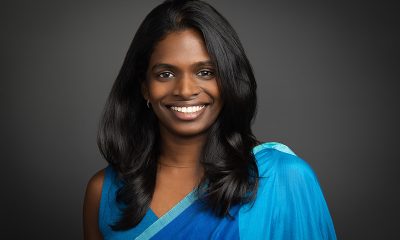
 Business6 days ago
Business6 days agoStandard Chartered appoints Harini Jayaweera as Chief Compliance Officer
-
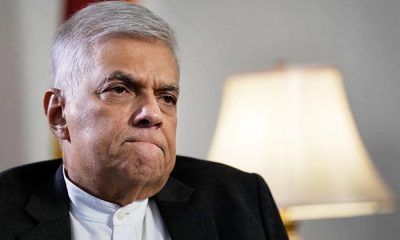
 News7 days ago
News7 days agoWickremesinghe defends former presidents’ privileges
-

 News5 days ago
News5 days agoFifteen heads of Sri Lanka missions overseas urgently recalled
-

 News5 days ago
News5 days agoFive-star hotels stop serving pork products
-
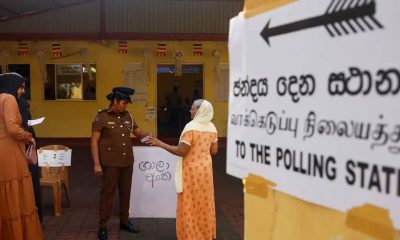
 Features5 days ago
Features5 days agoWaiting for a Democratic Opposition
-
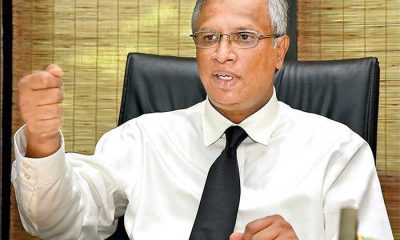
 News4 days ago
News4 days agoITAK denies secret pact with NPP
-
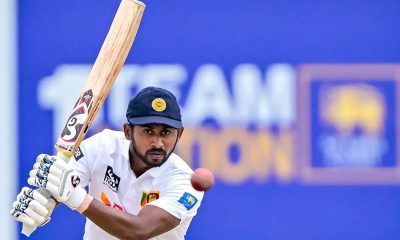
 Sports5 days ago
Sports5 days agoSri Lanka’s path to Lord’s
-
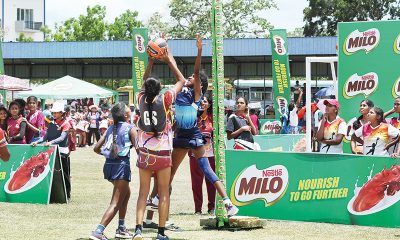
 Sports7 days ago
Sports7 days agoMilo powered Schools Netball finals from November 4


